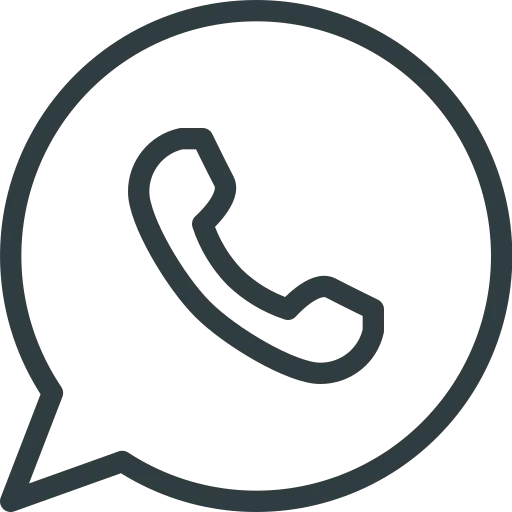
Author: Christopher Yip
Date Published: 3 June 2025
How To Set Auto Reply in WhatsApp for Your Business?
You probably already use WhatsApp to chat with friends and family, but have you ever thought about using it to grow your business?
More and more companies are tapping into WhatsApp for customer communication, and one of the easiest ways to step up your game is by setting up auto replies. Imagine this: a customer messages you after hours, and instead of silence, they instantly get a warm, helpful response. That’s how you build trust even when you’re not around.
And let’s be real, people hate waiting. Google found that over half of mobile users leave a site if it takes more than three seconds to load. In customer service, it’s even more intense. One bad experience, and 61% of customers won’t come back. That’s a lot of pressure but also a great reason to automate your replies and stay one step ahead.
Table of Contents
1. What is WhatsApp Auto Reply?
2. The Benefits of WhatsApp Auto Reply for Businesses
3. How to Set Auto Reply in WhatsApp?
4. WhatsApp Auto Reply Messages Best Practices
5. Limitations of WhatsApp Business Auto Replies
6. A Smarter Alternative: WhatsApp Chatbot for Businesses
7. Frequently Asked Questions
What is WhatsApp Auto Reply?
In simple terms, WhatsApp auto-reply is a feature that lets you send automated responses when you can't respond in real time. Think of it as your smart assistant that instantly replies with a preset message. Whether it’s a quick “We’ll get back to you soon!” or a detailed reply during off-hours, it helps keep your customers informed and engaged.
If you're using the WhatsApp Business app, auto-replies become even more flexible. You can customize different types of messages, schedule when they’re active, and make sure your customer service stays responsive even when you’re not online.
The Benefits of WhatsApp Auto Reply for Businesses
Automatic replies are more than just a time-saver. They’re a smart way to improve business communication and customer satisfaction. Here are just a few ways how WhatsApp auto reply can benefits your business:
24/7 Responsiveness
Customers receive instant replies at any time, including outside business hours. This creates the impression that your business is always available.
Faster Handling of Repetitive Inquiries
Common questions can be answered automatically, reducing the need for manual replies and improving overall efficiency.
Reduced Pressure on Support Teams
Auto-replies handle the initial engagement, giving your team more breathing room to focus on complex or high-priority requests.
Clear and Consistent Messaging
Automated replies ensure customers receive accurate, on-brand information every time, without delay.
Improved Customer Experience
Prompt replies show professionalism and care. Even automated acknowledgments can strengthen trust and boost your brand image.
Personalization at Scale
With the right setup, messages can include names or relevant info—making automation feel more human and thoughtful.
How to Set Auto Reply in WhatsApp?
There are two ways to send automatic replies on WhatsApp:
1. From the WhatsApp Business app
2. Via a WhatsApp partner platform that gives you access to the WhatsApp API.
Option 1: Setting Auto Replies in WhatsApp Business App
The first option uses the WhatsApp Business app, ideal for setting up basic away messages or automated welcome greetings. It’s simple to configure, though the message types you can send are somewhat limited. Below are the guide on how to set up the auto reply in WhatsApp Business App:
Step 1: Open your WhatsApp
Click the three dotted lines on the top right corner or the "tools" icon on the bottom right to open business tools setting.
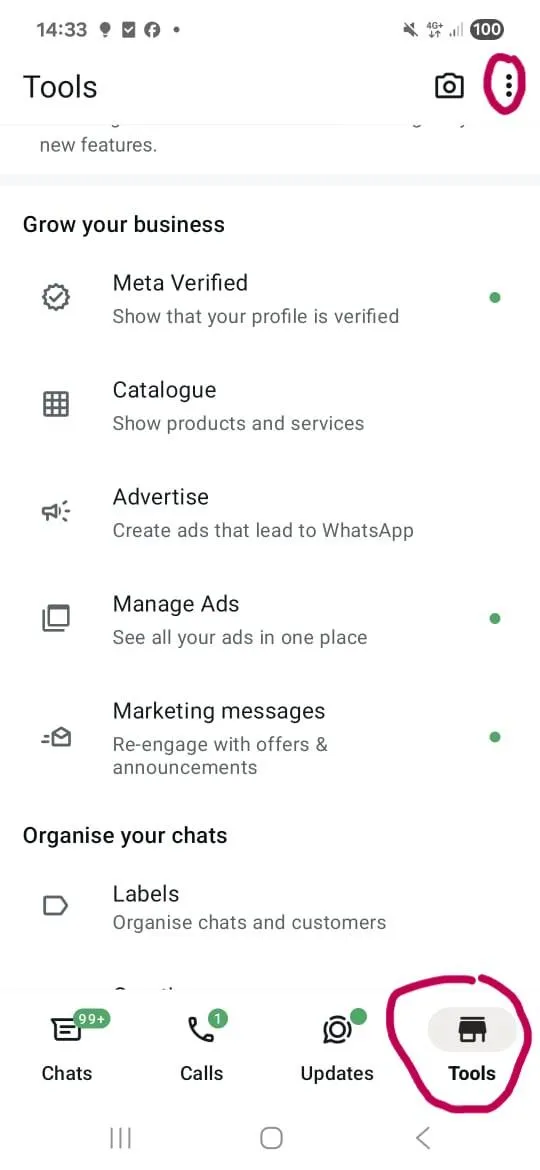
Step 2: Scroll to "Organize Your Chats"
Scroll to the "organize your chats" section, at there you will be able to set up auto reply messages for greeting, away, and quick replies.
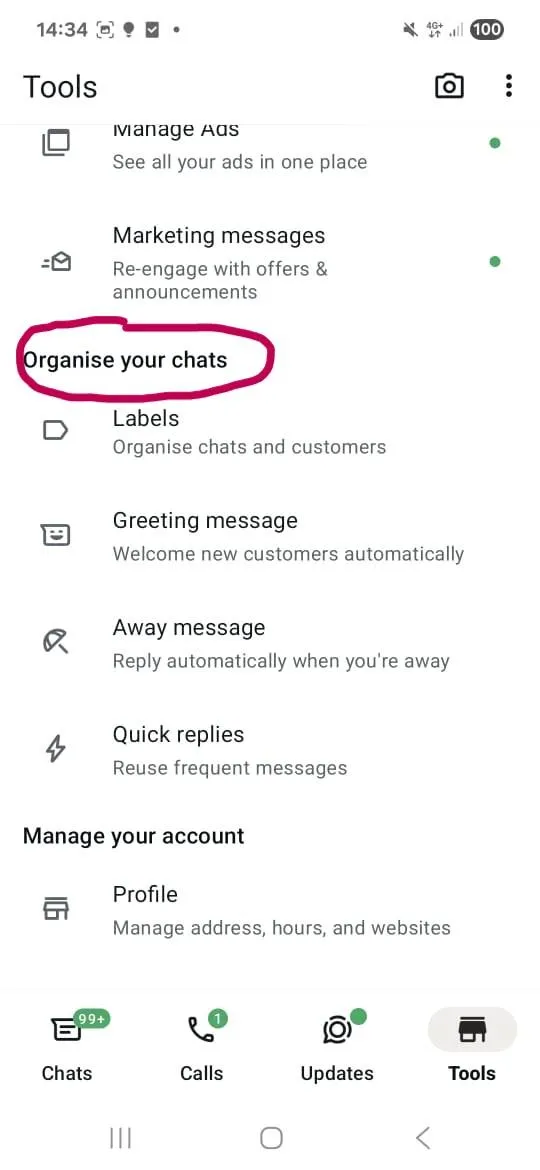
Step 3: Click any kind of messages that you want to automate
For example, if you want automatically send message after business hours, then click on "away message" and toggle the button on to activate it and edit your "away messages".
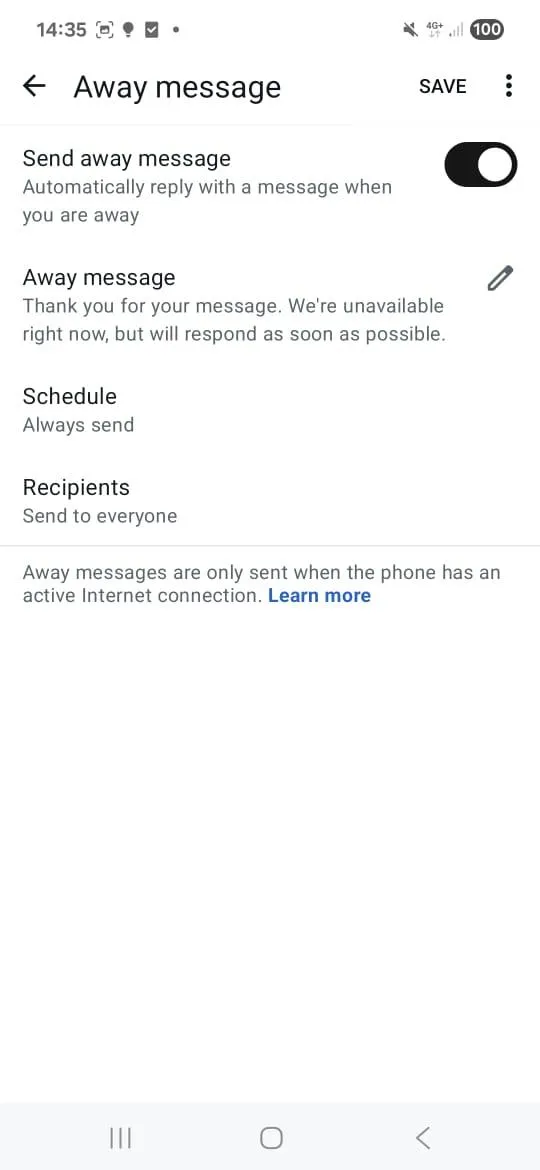
Step 4: Click on "Schedule" button to choose when to send your message
You have three options for choosing when to send your message.
Always: Start off all of your messages with a specific auto response. This is helpful if you are out of town for a week for example.
Custom schedule: This works great if there is a specific time when you know you won’t be in. If you have a meeting coming up next Tuesday, prepare your away message in advance!
Outside of business hours: Keep your customers informed even when closed by setting up your daily away hours. This is based on the hours in your business profile.
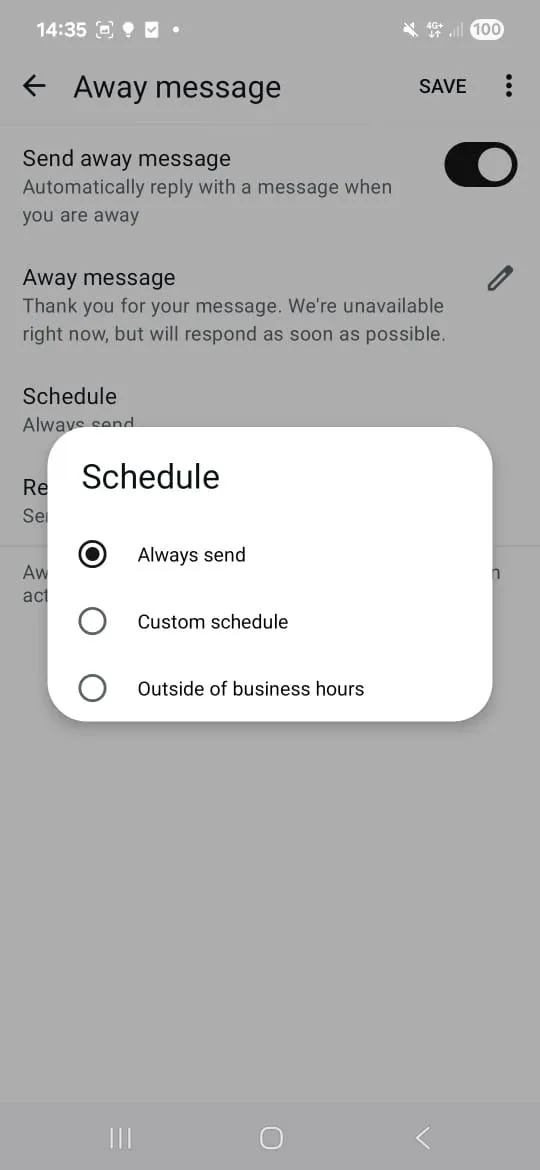
Step 5: Choose Your "Recipients"
Choose the recipients for your away message:
Everyone: Send automated messages to everyone who texts you after business hours.
Everyone not in the address book: Send messages to numbers not in your contacts list.
Everyone except: Exclude specific contacts from receiving auto-replies.
Only send to: Send messages to selected contacts.
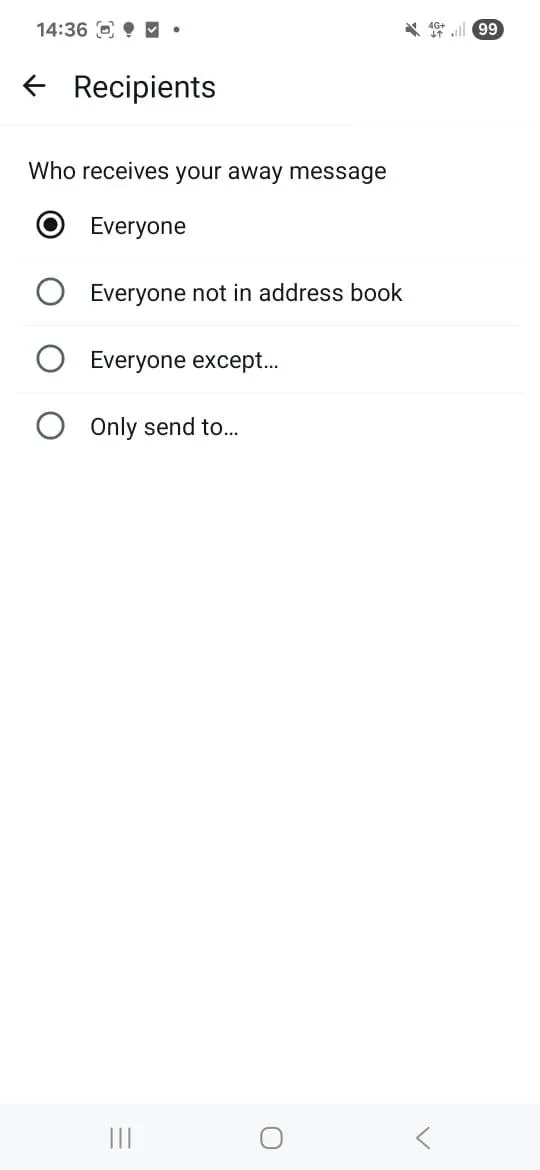
Step 6: Do the same for the rest
Once you finish setting up your away message, hit save and you’re almost done. Meta will have to verify your message first.
Option 2: Setting Auto Replies with WhatsApp Business API
The second method, WhatsApp Business API, is a more advanced and flexible solution built for medium to large businesses that need scalable automation and professional-level communication. Unlike WhatsApp Business App, the API allows you to create intelligent auto-reply flows, integrate with third-party platforms like an AI Chatbot system to deliver personalized, real-time responses at scale.
Here are some key advantages of setting up auto replies with WhatsApp Business API features you won’t get with the standard WhatsApp Business App:
Trigger auto-replies based on customer behavior
Encourage customer engagement with auto-send WhatsApp messages. Some ideas include:
Abandoned cart WhatsApp messages
Loyalty program updates
Price drop alerts
Birthday greetings
Order confirmations and opt-ins
Other transactional updates
Make it personal and engaging
You can customize auto-replies using templates, images, GIFs, and even quick links. These small touches can make your messages more interactive and memorable.
Keep leads warm
Once a customer interacts with your business, keep the momentum going. Share relevant booking links, event info, or product pages automatically to move them along the buyer journey without extra effort from your team.
To set up auto-replies with the WhatsApp Business API, you would typically need to go through a complex onboarding process applying for API access, verifying your business, integrating through a BSP (Business Solution Provider), and handling technical setup.
However, with SalesAI, everything becomes much simpler. We handle all the backend setup for you. Just click "Connect WhatsApp" on our platform, and your WhatsApp number will be linked instantly, no coding, no approval stress, no hassle. You can start sending smart auto-replies right away. Below are the guide to set up auto replies in WhatsApp with SalesAI:
WhatsApp Auto Reply Messages Best Practices
No matter which WhatsApp version you use, setting up an auto-reply is simple, but crafting the right message takes real effort. After all, your reply reflects your brand. Here are some tips that can you follow when crafting your reply messages:
1. Be clear and specific
Avoid vague promises like “We’ll get back to you soon.” Instead, say, “We’ll reply within 12 hours.” It sets expectations and builds trust.
2. Define your tone
Consistency matters. Use friendly, simple language, avoid jargon, and keep your tone aligned with your brand, whether it’s casual, professional, or playful.
3. Communicate the next step
Tell customers what happens next. Whether it’s a follow-up email, a report in three days, or a callback time, clarity increases confidence.
5. Offer other ways to reach you
Include store details, phone numbers, or link to other channels like Instagram, Telegram, or Facebook Messenger. An omnichannel inbox makes this seamless.
6. Add visuals for better engagement
Images, GIFs, or branded posters can help your message stand out. Visuals boost open rates and make your message easier to digest.
Limitations of WhatsApp Business Auto Replies
Although WhatsApp Business auto replies are helpful for basic responses, they come with several limitations that businesses should consider.
1. Lack of Personalization for Complex Queries
Auto replies can only handle straightforward messages. When customers raise detailed or case-specific concerns, pre-written replies often fall short, failing to provide the nuance or depth the situation demands.
2. Risk of Over-Automation
While automation saves time, excessive reliance on it can make your service feel cold or robotic. Customers value human interaction, especially when dealing with sensitive issues or needing tailored solutions.
3. Rigid Scheduling Options
You can schedule replies within fixed hours, but there’s little flexibility to adjust for unexpected events, like sudden holidays or temporary business disruptions. This rigidity may lead to outdated or inappropriate replies being sent out.
4. Miscommunication Due to Static Messaging
Auto replies are static by nature. If not regularly reviewed and updated, they can lead to confusion or misinformation. What once made sense might become outdated or irrelevant as your operations evolve.
5. Absence of Advanced Features
WhatsApp Business auto replies lack intelligence. They don’t understand intent, categorize messages, or respond contextually. There’s no built-in logic to adjust replies based on what customers actually ask.
6. Risk of Repetitive or Spammy Responses
If not carefully configured, auto replies may trigger repeatedly, frustrating customers who receive the same message over and over. This not only damages the customer experience but could also be flagged as spam.
7. Limited Brand Expression
Although you can customize the text, you can’t control the design or format beyond WhatsApp’s basic layout. This restricts your ability to fully reflect your brand voice and style in every message.
8. Lack of Interactive Capabilities
Auto replies can’t carry on a conversation. They don’t respond to customer input, ask follow-up questions, or redirect conversations to more helpful resources, making them unsuitable for complex support scenarios.
A Smarter Alternative: WhatsApp Chatbot for Businesses
If you’ve hit the ceiling with basic auto-replies, it’s time to consider WhatsApp Chatbots, a more advanced and dynamic solution.
Unlike fixed, one-way auto-replies, chatbots are interactive and intelligent. They understand user intent, provide instant answers, ask follow-up questions, and even guide customers through complex tasks like placing orders, booking appointments, or checking delivery status.
1. Real Conversations, Not Just Messages
Chatbots simulate real human dialogue. Instead of just sending a canned response, they engage customers with logic-based flows that adapt to user input.
2. Save Time Without Losing the Human Touch
Automate 80% of common inquiries like pricing, order tracking, and product FAQs, freeing your team to handle cases that really need a human.
3. Personalization at Scale
Chatbots can use customer names, previous purchase data, and preferred languages to create highly personalized experiences, which is something auto-replies simply can’t do.
4. Built-in Lead Capture and Follow-Up
You can turn casual chats into qualified leads by capturing phone numbers, emails, and product interests, then trigger follow-ups automatically.
5. Seamless Integration with Your Tools
Modern chatbot platforms like SalesAI seamlessly integrate with tools like Google Sheets and Google Calendar, making your customer support smarter, faster, and more organized.
While auto-replies are a useful starting point, real customer satisfaction comes from timely, personalized, and meaningful interactions. By leveraging advanced chatbot technology, businesses can transform WhatsApp into a powerful tool for customer service and growth. It’s time to automate smarter and connect better.
Frequently Asked Questions
What is WhatsApp Auto Reply?
WhatsApp auto reply is a feature in WhatsApp Business that automatically sends a prewritten message when you can’t respond right away. This helps keep your customers engaged and improves your customer service responsiveness.
How do I set up WhatsApp Business Auto Reply?
To set up auto replies, open the WhatsApp Business app, go to ‘Settings’ > ‘Business settings’ > ‘Away message’. From there, you can create your custom message and set the schedule for when it should be sent.
Can I customize WhatsApp Auto Reply messages for different customers?
Yes, you can tailor your auto-reply messages according to common questions or customer segments, making your responses more personalized and relevant.
Is it possible to schedule WhatsApp Auto Replies for specific times?
Definitely! You can schedule your auto replies to activate during specific hours or when you’re marked as ‘Away’, which helps manage customer expectations outside of business hours.
How does WhatsApp Auto Reply benefit my business?
Auto replies help maintain continuous communication with customers by providing instant responses, boosting satisfaction, and supporting business growth and customer retention.
Can I include links and contact details in my WhatsApp Auto Reply messages?
Yes, you can add links, contact information, or even promotional content within your auto-reply messages to direct customers to your website, store, or other important resources.
Is there a limit to how many auto replies I can set in WhatsApp Business?
Currently, there’s no strict limit on the number of auto replies you can create. Just make sure your messages stay organized and relevant to your customers’ needs.
Does WhatsApp Auto Reply work for both individual and group chats?
Yes, you can set auto replies to work for both one-on-one conversations and group chats, ensuring you stay responsive on all fronts.
How can I tell if my WhatsApp Auto Reply is working well?
Keep an eye on customer reactions and engagement. Regularly update your messages based on feedback and changing business needs to keep them effective.
What should I avoid when setting up WhatsApp Auto Replies?
Avoid using generic or vague messages. Instead, customize your replies to match your brand’s tone and address common questions clearly. Also, remember to review and update your messages frequently to keep them relevant.



